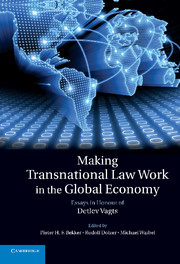Book contents
- Frontmatter
- Contents
- List of contributors
- Foreword: the transnationalism of Detlev Vagts
- List of cases cited
- List of abbreviations and acronyms
- Introduction: a Festschrift to celebrate Detlev Vagts' contributions to transnational law
- 1 Detlev Vagts and the Harvard Law School
- 2 Constructing and developing transnational law: the contribution of Detlev Vagts
- I International law in general
- II Transnational economic law
- III Transnational lawyering and dispute resolution
- 23 Diffusion of law: the International Court of Justice as a court of transnational justice
- 24 Regulating counsel conduct before international arbitral tribunals
- 25 International arbitrators as equity judges
- 26 Customary international law, Congress and the courts: origins of the later-in-time rule
- 27 Mediation and civil justice: a public–private partnership?
- 28 The borders of bias: rectitude in international arbitration
- 29 Managing conflicts between rulings of the World Trade Organization and regional trade tribunals: reflections on the Brazil – Tyres case
- 30 Cross-border bankruptcy as a model for the regulation of international attorneys
- Bibliography of Detlev Vagts
- Index
25 - International arbitrators as equity judges
from III - Transnational lawyering and dispute resolution
Published online by Cambridge University Press: 17 November 2010
- Frontmatter
- Contents
- List of contributors
- Foreword: the transnationalism of Detlev Vagts
- List of cases cited
- List of abbreviations and acronyms
- Introduction: a Festschrift to celebrate Detlev Vagts' contributions to transnational law
- 1 Detlev Vagts and the Harvard Law School
- 2 Constructing and developing transnational law: the contribution of Detlev Vagts
- I International law in general
- II Transnational economic law
- III Transnational lawyering and dispute resolution
- 23 Diffusion of law: the International Court of Justice as a court of transnational justice
- 24 Regulating counsel conduct before international arbitral tribunals
- 25 International arbitrators as equity judges
- 26 Customary international law, Congress and the courts: origins of the later-in-time rule
- 27 Mediation and civil justice: a public–private partnership?
- 28 The borders of bias: rectitude in international arbitration
- 29 Managing conflicts between rulings of the World Trade Organization and regional trade tribunals: reflections on the Brazil – Tyres case
- 30 Cross-border bankruptcy as a model for the regulation of international attorneys
- Bibliography of Detlev Vagts
- Index
Summary
Introduction
Law, private law in particular, has a capacity – perhaps a natural inclination – to become rigid or even stultify. It may be asked why this is the case. In regulation, the law is what a State orders or decrees it to be and as such it is what it is. But if we step back from the idea that all law, including private law, issues from a sovereign and accepts instead other sources of law besides legislation (or treaty law) and implementing case-law, like fundamental principles (now often human rights-related but earlier often referred to as natural law having a strong moral or even religious connotation), custom or industry practices, general principles (which may be found among the more advanced legal systems or in reason or common sense) and party autonomy, this broader perspective would suggest that there is ample room for private law to reform itself.
One may recognise here the sources of law that for public international law are recognised in Art. 38(1) of the Statute of the International Court of Justice (ICJ). Like public international law, private law may move forward independently in a similar manner, at least at the international level. This is the modern idea of its transnationalisation and, in international commerce and finance, of the modern lex mercatoria, which is then perceived as depending on these various sources of law and maintaining a hierarchy of rules emanating from them.
- Type
- Chapter
- Information
- Making Transnational Law Work in the Global EconomyEssays in Honour of Detlev Vagts, pp. 510 - 530Publisher: Cambridge University PressPrint publication year: 2010



